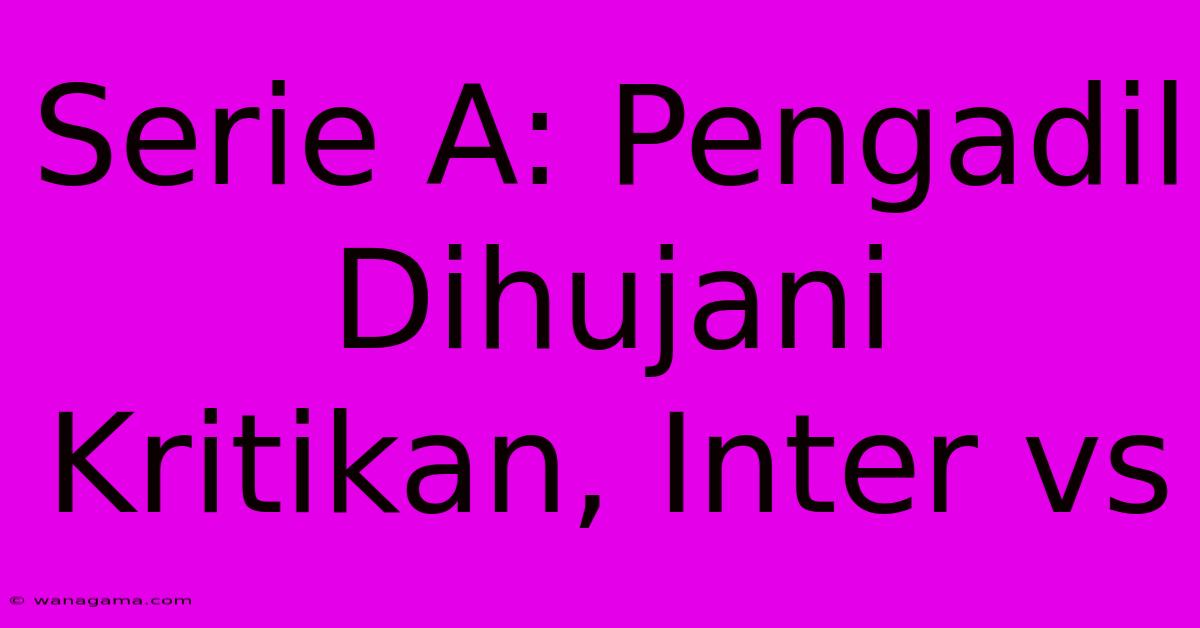Serie A: Pengadil Dihujani Kritikan, Inter Vs

Discover more detailed and exciting information on our website. Click the link below to start your adventure: Visit Best Website mr.cleine.com. Don't miss out!
Table of Contents
Serie A: Referees Under Fire After Controversial Inter vs. [Opponent Name] Match
The Serie A season continues to be a rollercoaster of emotions, with high-octane football and, inevitably, its fair share of controversy. The recent clash between Inter Milan and [Opponent Name] sparked a firestorm of criticism aimed squarely at the match officials, highlighting the ongoing debate surrounding refereeing standards in Italian football. The game, which ended [Result of the Match], saw several key decisions that have left fans, pundits, and even players questioning the competence and impartiality of the officiating team. This article will delve into the specifics of the controversial moments, analyze the broader implications for Serie A, and explore potential solutions to improve refereeing in the league.
Key Controversial Decisions: A Breakdown
The match between Inter and [Opponent Name] was far from uneventful, with several pivotal incidents leaving a bitter taste in the mouths of many. The most contentious moment was undoubtedly [Describe the first controversial decision in detail, including time, players involved, and the referee's decision. Mention any replays or VAR involvement]. This decision immediately sparked outrage amongst Inter fans [or [Opponent Name] fans, depending on the situation], who felt it was a clear [foul/mistake/incorrect call]. Many argued that the referee [Name of the referee] was either incompetent or biased, with social media platforms erupting with angry reactions.
Another flashpoint came in the [Minute] minute, when [Describe the second controversial decision, including details similar to the first]. This incident further fuelled the flames of controversy, with many accusing the refereeing team of inconsistency and a lack of clear understanding of the rules. The lack of a clear explanation from the officials only exacerbated the situation, leaving fans feeling unheard and frustrated.
Furthermore, [Describe any other significant controversial moments, providing details as before]. This cumulative effect of questionable decisions significantly impacted the flow of the game and arguably influenced the final result, leading to widespread accusations of refereeing impacting the outcome of a critical Serie A match.
The Broader Implications for Serie A
The controversy surrounding the Inter vs. [Opponent Name] match is not an isolated incident. Italian football has a long history of refereeing controversies, often leading to accusations of bias, incompetence, and even corruption. Such incidents undermine the integrity of the league, eroding the trust of fans and potentially impacting the overall appeal of Serie A to a global audience. The negative publicity generated by these controversies can also affect sponsorships and broadcasting deals, ultimately harming the financial health of the league.
The impact extends beyond the immediate match. The constant questioning of refereeing decisions creates an atmosphere of uncertainty and frustration, affecting players' morale and potentially influencing their performance on the field. The risk of controversial calls overshadows the quality of the football itself, detracting from the enjoyment of the sport for both players and spectators. This, in turn, can lead to a decline in match attendance and a decrease in viewer engagement.
Potential Solutions: Addressing the Refereeing Crisis
Addressing the ongoing issues with refereeing in Serie A requires a multi-pronged approach. Several key strategies could be implemented to improve the situation:
-
Improved Referee Training and Technology: Investing in advanced training programs for referees, incorporating cutting-edge technology like VAR and advanced analytics, is crucial. This includes focusing on decision-making processes, consistent application of rules, and communication skills.
-
Increased Transparency and Accountability: Referees should be held accountable for their decisions. Post-match reviews, explanations of controversial calls, and an independent body to assess referee performance could enhance transparency and build trust.
-
Strengthening the VAR System: The effectiveness of the VAR system relies heavily on its proper implementation and the competence of the VAR officials. Clearer guidelines, more stringent training, and better communication between on-field referees and VAR officials are essential.
-
Promoting Referee Independence: Ensuring referees are free from undue influence or pressure is paramount. This requires strengthening ethical guidelines and establishing robust mechanisms to address any potential conflicts of interest.
-
Fan Engagement and Dialogue: Establishing open channels of communication between the league, referees, and fans is important. Regular forums, Q&A sessions, and opportunities for feedback can foster better understanding and address concerns.
Conclusion: The Need for Urgent Action
The controversy surrounding the Inter vs. [Opponent Name] match is a stark reminder of the challenges facing Serie A in terms of refereeing. The criticisms leveled against the match officials are not trivial; they represent a deep-seated concern about the integrity and fairness of the league. Failure to address these issues decisively will only further erode the trust of fans and damage the reputation of Serie A on a global scale. Urgent action is needed to implement the necessary reforms and ensure that future matches are judged fairly and impartially, allowing the beautiful game to take center stage. The future of Serie A depends on it.

Thank you for visiting our website wich cover about Serie A: Pengadil Dihujani Kritikan, Inter Vs. We hope the information provided has been useful to you. Feel free to contact us if you have any questions or need further assistance. See you next time and dont miss to bookmark.
Also read the following articles
| Article Title | Date |
|---|---|
| Wolves Vs Forest Premier League Langsung | Jan 08, 2025 |
| Kritikan Keras Pengadil Serie A Inter Vs | Jan 08, 2025 |
| Keputusan Akhir Galeri Wolves 0 3 Nottingham Forest | Jan 08, 2025 |
| Nottingham Forest Tumbangkan Wolves 3 0 | Jan 08, 2025 |
| Pasaran Saham Nvidia And Teknologi Ai | Jan 08, 2025 |
